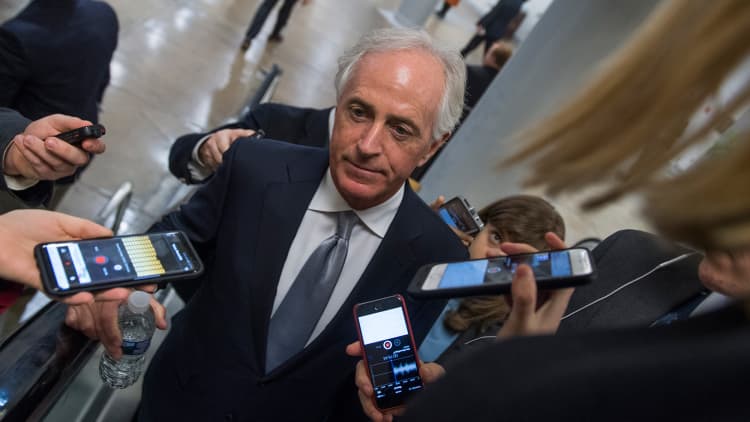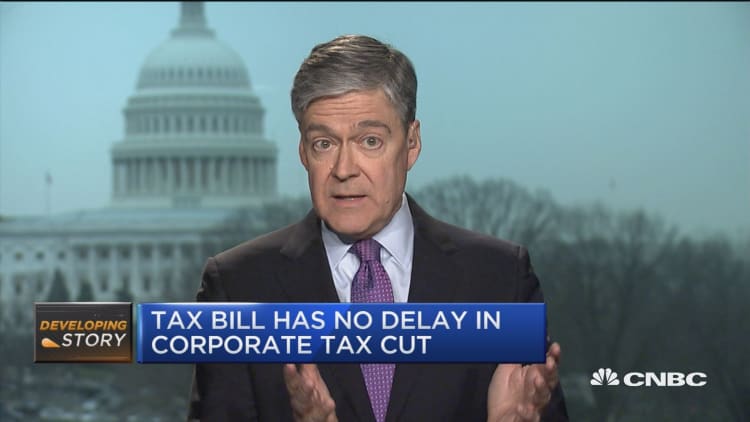
Republicans rushed Friday to nail down their final tax bill — and got a boost when two wavering senators committed to supporting the plan next week.
On Friday, House and Senate Republicans plan to release their joint tax legislation, which a House and Senate conference committee finalized earlier in the day. They aim to pass the bill in both chambers by the middle of next week, getting President Donald Trump's signature before Christmas to hit their year-end target.
Backing from Sens. Marco Rubio, R-Fla., and Bob Corker, R-Tenn., on Friday all but assured the GOP will have the support to pass the legislation next week.
New issues for the plan emerged on Thursday. Rubio said, "I won't support the bill" unless GOP leaders expand the child tax credit. Sen. Mike Lee, R-Utah, who has not yet committed to supporting the bill, also sought more tax relief for working families.
After the GOP moved to boost access to the credit, Rubio's office confirmed Friday afternoon that he would vote for the bill. Then, GOP Sen. Bob Corker of Tennessee — the only Republican to vote against the Senate version of the bill — committed to supporting the final plan.
Sen. Susan Collins, R-Maine, has not yet backed the proposal. GOP Sens. John McCain of Arizona and Thad Cochran of Mississippi have also missed votes this week due to health reasons, though Senate leaders have said they will be available to help push the tax bill through next week.
Those factors created yet another last-minute scramble for Republicans to secure enough party votes to achieve their key legislative goal. They can lose votes from two of 52 GOP senators and still pass their tax overhaul with a tiebreaking vote from Vice President Mike Pence, who delayed a planned Middle East trip to oversee next week's vote.
A desire to have a legislative accomplishment to promote ahead of next year's midterm elections has partly prompted the GOP rush to pass a tax plan. Republicans are forging ahead with the legislation — despite dismal public opinion polling and congressional projections estimating that the modest economic growth sparked by it will fall well short of paying for tax cuts.
The GOP expects to release a bill at 5:30 p.m. ET, on Friday, said Rep. Kevin Brady, R-Texas, the chairman of the House and Senate conference committee that drafted the final bill. He signed a so-called conference report finalizing the bill on Friday.
Republicans are optimistic they have the votes to pass their plan next week.
"I'm confident at the end of the day the Senate will approve this conference committee report," Brady told reporters Friday.
On Friday, Rep. Kristi Noem, R-S.D., told reporters that the GOP would increase the refundable part of the proposed $2,000 credit to $1,400 from $1,100. While the tweak earned Rubio's support, Lee still has not committed to supporting the plan.
Trump on Friday projected that the proposal would have no problems passing.
"I have seen [the bill]. I think it's going to do very, very well," he told reporters.
However, the timing of a final vote is "in flux," Senate Majority Whip John Cornyn, R-Texas, tweeted on Thursday. The Senate had planned to vote on the bill before the House, but the health problems faced by McCain and Cochran have added uncertainty.
"It's all about timing and managing absences in the Senate. ... We're simply being flexible to honor their concerns about managing their schedule and some possible absences," House Speaker Paul Ryan said on Thursday.
As for the plan itself, Republicans have compromised on many of the differences between the bills passed by the House and Senate. The GOP appears to need to finalize some provisions, such as the child tax credit.
Here's what the GOP is expected to include in the final plan, according to CNBC and other news outlets.
- The bill would chop the corporate tax rate to 21 percent from 35 percent, effective in 2018. The House and Senate previously proposed a 20 percent rate. The White House also pushed for 20 percent.
- The top individual income tax rate would fall to 37 percent from 39.6 percent. It would set seven brackets, matching the number in the Senate plan, rather than the four called for in the House bill. Individual tax cuts may expire within 10 years, as they did in the Senate bill.
- The plan would roughly double the standard deduction to $12,000 for individuals and $24,000 for families. However, it would scrap the personal exemption used by many taxpayers.
- The bill would allow taxpayers to deduct up to $10,000 in state and local property taxes. It would also include some form of deduction for state and local income taxes, appeasing Republican lawmakers from high-tax blue states who worried about their constituents losing tax breaks.
- It would set a 20 percent business income deduction for pass-through businesses. Two senators voted for the Senate plan only after securing a 23 percent deduction for that income.
- It is expected to scrap Obamacare's provision that requires most Americans to buy health insurance or pay a penalty. Doing so is projected to lead to 13 million fewer people with insurance and raise average Obamacare premiums, according to the nonpartisan Congressional Budget Office.
- It allows taxpayers to deduct interest on up to $750,000 in mortgage loans.
- The estate tax, or so-called death tax, would remain but the exemption from it would be doubled.
- The medical expense deduction would get expanded.
- The plan would eliminate the corporate alternative minimum tax, which the Senate added back to its plan at the last second to raise money. House leaders and corporate groups said the tax would stifle research and development.
The changes bring fresh questions about how Senate Republicans will pay for tax breaks included in the bill. Under budget rules set by the Senate earlier this year, their bill cannot increase budget deficits by more than $1.5 trillion over a decade.
While previous versions of the bill narrowly stayed under that threshold, it is unclear now if the final bill will. The congressional scorekeeper Joint Committee on Taxation is expected to release a deficit estimate before final votes.
— CNBC's Ylan Mui contributed to this report
WATCH: The tax bill's final challenges



